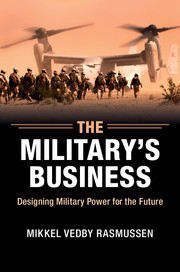Description
The Military's Business
Designing Military Power for the Future
Author: Rasmussen Mikkel Vedby
Argues that Western militaries must reform in order to become viable businesses that address relevant security issues within realistic budgets.
Language: English
Subject for The Military's Business:
Approximative price 31.44 €
In Print (Delivery period: 14 days).
Add to cart
The Military's Business
Publication date: 03-2015
232 p. · 15.2x22.8 cm · Paperback
Publication date: 03-2015
232 p. · 15.2x22.8 cm · Paperback
Approximative price 79.75 €
In Print (Delivery period: 14 days).
Add to cart
The Military's Business
Publication date: 03-2015
232 p. · 15.8x23.5 cm · Hardback
Publication date: 03-2015
232 p. · 15.8x23.5 cm · Hardback
Description
/li>Contents
/li>Biography
/li>
If the military were a business, would you buy shares? Over recent years, Western armed forces, particularly the US, have been costing more yet achieving less. At the same time, austerity measures are reducing defence budgets. This book uses defence data to examine the workings of modern Western militaries and explore what kind of strategies can overcome this gap between input and output. Instead of focusing on military strategy, Mikkel Vedby Rasmussen seeks to draw on the ideas of business strategy to assess alternative business cases - reforming military HR to combat instability in the 'Global South' or utilising new technologies to overcome the prohibitive costs of current systems. Analysing the philosophical, strategic and budgetary underpinnings of these alternatives, he concludes that a more radical break from current military organisational practices is needed which would allow them to fit within a nation's overall national security system without ever-increasing budgets.
1. Introduction; 2. The modern military system; 3. The modern military system: the US case; 4. The counterinsurgency business model; 5. Converging technologies business model; 6. Designer wars.
Mikkel Vedby Rasmussen is a professor at the University of Copenhagen. He is currently on leave working on policy development in the Danish Ministry of Defence. Rasmussen has previously headed the Centre for Military Studies and the Danish Institute for Military Studies in Copenhagen. He was published widely on security and defence matters, including The Risk Society at War (Cambridge University Press, 2006).
© 2024 LAVOISIER S.A.S.




